











This page is best viewed in
1024x768

|
Historically:
The collective gods of Haldun are referred to as The Five. They're recognised as the equal lords of The Mirror Realm, and the masters of all life in the known world. While individuals may devote their prayers to one of The Five, almost all of Haldun's people recognise the importance of the other gods and their associated role.
During the exodus: In the year of 7 BF, the War of Four Nations started to go badly for Haldun, resulting in their defeat and eventual exodus from Old Haldun on the continent of Deagerad to Berkatan, where modern day Haldun is built.
It was in this year that the various priests of The Five stopped hearing the Gods; prayers would have unpredictable results, or sometimes not work at all. The people of Haldun were angered at this, believing the gods to have abandoned them in their time of need. Many a priest suffered at the hands of angry mobs venting their frustrations on the Gods' mortal servants.
Today:
In the fifty or so years that have passed since the fall, Haldun's people have made a life for themselves without the Gods. Many are of the opinion that they do not need The Five. Some however, cling to the old ways, firm in their belief that The Five have not truly abandoned them, and that man is not meant to understand the ways of Nisourel, where the gods reside.
Lately rumours have surfaced of some priests managing to find power from the heavens once more, though public opinion still claims this is untrue, and that the gods are distant, uncaring and unnecessary.
Haldun lacks churches of any size, though small shrines are said to exist out of the public eye.
Alignments and the Gods:
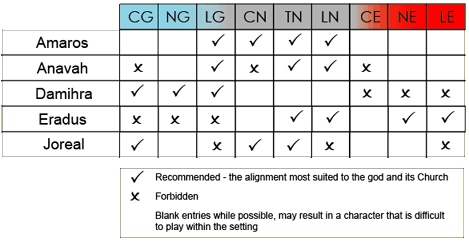

Damihra
|
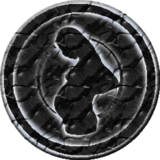
|
Alignment: Good
Gender: Female
Domains: Earth, Good, Healing, Plant, Water, Dream
Other names: The Mother, Bringer of Harvest
Typical Followers: Midwives, healers, farmers.
Damihra, The Mother is a kind and patient goddess striving for growth and happiness among her people. She is worshipped by many as the giver of life and the mother of creation itself. Damihra is a goddess of compassion and healing, but not of weakness or pity. Her followers are expected to live, to truly be alive and know themselves as well as others and appreciate the gift they have been given.
|
Tenets of Damihra
- Life is a gift; it is to be celbrated, honoured and enjoyed.
- Life is a journey; we must be prepared for the trials in our path
- Nurture the needs of the people of the needs of a few.
- Do not let fear stay your hand when your heart says strike.
- Sew your seeds, grow life where all is barren
Clergy of Damihra
The clergy of Damihra seek to keep life sacred, and fresh. They serve as protectors of the weak, but only so far as that they will then expect the weak to grow, encouraging people to enjoy their vitality. The Church acknowledges the natural order of things and the life cycle. They are opposed to needless suffering or harm to any living creature, and will defend their cause with a righteous fury.
|

|
Anavah
|
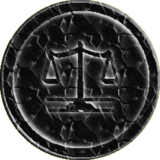
|
Alignment: Neutral
Gender: Female
Domains: Fire, Knowledge, Magic, Travel, Sun, Law
Other names: The Savant, Thardin (among the Nitari), The Sun Goddess, Bringer Of Light
Typical Followers: Merchants, Officials, Diplomats, Magistrates
Anavah is the goddess of structure and trade rewarding her followers and faithful with knowledge and understanding. The light of Anavah always seeks the truth, and chases away fear and doubt. Anavah's followers are taught to value knowledge and diplomacy, and trust that the goddess will grant them order.
|
Tenets of Anavah
- Chaos destroys indiscriminately; we must be wary of its touch
- The light of truth reveals all, and chases away the darkness where lies breed
- Strength without unity is nothing
- Diplomacy and compromise are our strengths
- The path towards understanding has no end
Anavah is to some of her followers known as a goddess of passion. Not passion to other people but passion to studies of knowledge, trade and arts.
Clergy of Anavah
Anavah's clergy serve the people of Haldun as wise and well-educated priests. All of Anavah's clergy are able to read and write, as they consider it their sacred duty to record and study history.
The Church clashes most often with followers of Joreal, who they often view as misguided and without purpose.
|

|
Joreal
|

|
Alignment: Neutral
Gender: Male
Domains: Trickery, Travel, Knowledge, Chaos, Luck
Other names: The Harlequin, King of Masks, The Jester
Typical Followers: Bards, thieves and liars
Among The Five, Joreal serves as the questioner and the bringer of fresh wisdom. He is the god of asking 'why' and seeking out truth beyond the obvious. Joreal expects no fixed behaviour from his followers, hence they are a loose and varied lot.
|
Tenets of Joreal
- A truth is no less true for being harsh; speak it all the same
- Pride is a barrier against progress; do not let it hinder you
- Wisdom comes in many forms; let your eyes be open to the unfamiliar
- Tradition has its place, but do not let it cloud your judgment
- The realm is vast; do not become tangled within one part of it
Clergy of Joreal
There is no formal Church of Harlequin, and most people are happy with that.
|

|
Amaros
|
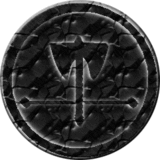
|
Alignment: Neutral
Gender: Male
Domains: Evil, Protection, Strength, Fury, War
Other names: The Lord of War
Typical Followers: Soldiers and warriors
Amaros, as the Lord of War, is percieved as all that is included in battle and strife. The blood spilt in war moistens the dry earth in Amaros' name, whether one wants it or not. Amaros is the God of the strength in battle. The desire to be mighty is not enough; one must be strong.
|
Tenets of Amaros
- Respect your enemy, be they worthy or not; respect him enough to be relentless, and enough to cease if he is unarmed.
- Strengthen yourself, so that you might become worthy of His attention.
- Control yourself, so that every act might be deliberate and firm.
- Let your sword be your honour, so that every stroke will make Him greater.
- Stand against those waging dishonourable war by showing them the meaning of honourable combat.
Clergy of Amaros
The clergy of Amaros seek to promote that which is strong and honourable. Life is war, and as thus every aspect of life must be approached as would one approach war. One must not be merciful for the sake of mercy, but only for the sake of honour. One does not strike against the weak for there is no honour in defeating the weak. One does not strike at the unarmed, for there is no honour in defeating the unarmed.
It is a saying of the worshippers of Amaros that when in peace, one must prepare for war, and when in war one must prepare for peace.
|

|
Eradus
|
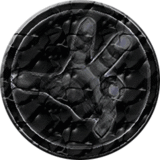
|
Alignment: Evil
Gender: Male
Domains: Earth, Evil, Death, Destruction, Cold, Darkness
Other names: The Lord of Sleep, The Unmaker
Typical Followers: Any
Eradus is the great unmaker, the Lord of Iyegos who collects the souls of the dead, returning us to The Five and eternal peace within Nisourel. The Lord of Sleep protects us, his Children from the horrors of undeath by hearing our prayers and burial rites which honour him.
|
Tenets of Eradus
- The Sleeping Lord is patient, as are we
- The Sleeping Lord is unforgiving, as are we
- The Sleeping Lord is dutiful, as are we
- The Sleeping Lord is quiet, as are we
- The Sleeping Lord is eternal, as are we
Clergy of Eradus
The Church of Eradus carry out the Sleeping Lord's will throughout the land. They serve as the performers of burial rites, sending the souls of the departed on their way to be reunited with The Five.
The Church considers destroying undead to be their divine duty, and will not tolerate necromancy of any kind.
|

|
|
|
|

|



